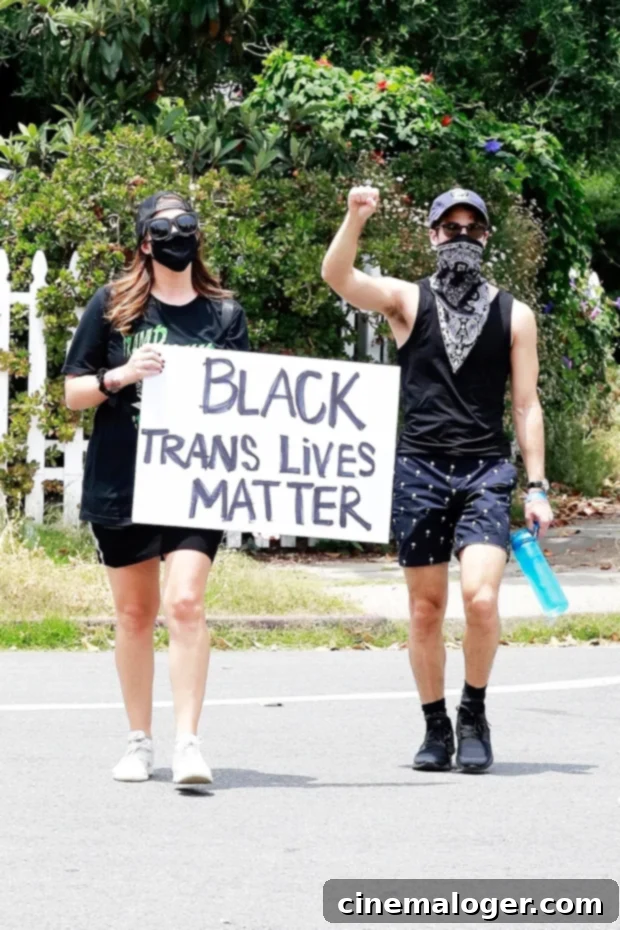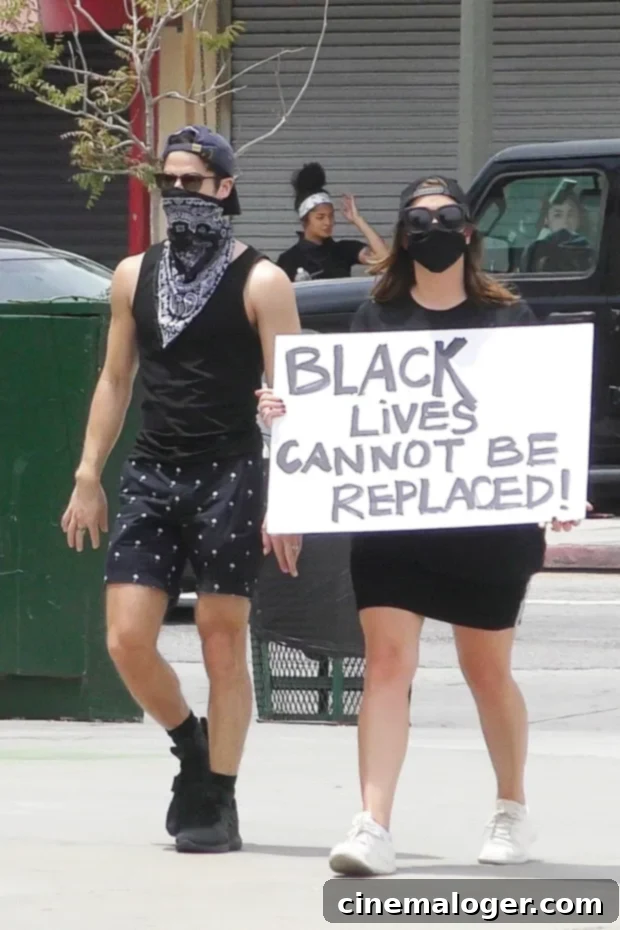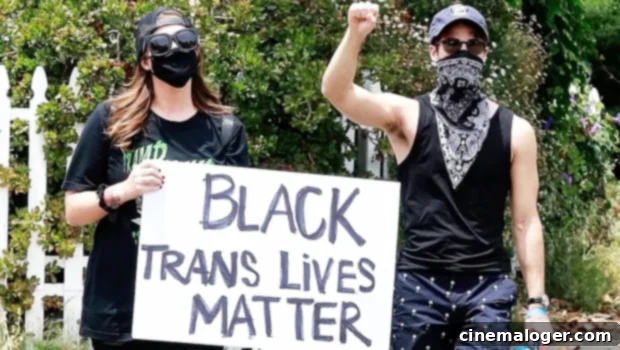Darren Criss and Mia Swier Champion Black Trans Lives at Hollywood’s Landmark BLM Protest
On June 2, 2020, as the streets of Hollywood swelled with protestors demanding justice and an end to systemic racism, two familiar faces stood out amongst the crowd: Hollywood star Darren Criss, 33, and his wife, director and producer Mia Swier. Their presence at the demonstration, ignited by the tragic death of George Floyd, carried a deeply resonant message. While many signs unequivocally proclaimed “Black Lives Matter,” Criss and Swier chose to shine a specific light on a community often marginalized even within broader social justice movements: Black transgender people. Their sign, boldly stating “Black Trans Lives Matter,” served as a powerful reminder of the intersectional struggles faced by individuals at the crossroads of racial and gender identity, underscoring the vital need for comprehensive advocacy and support.
The decision by Darren Criss and Mia Swier to highlight “Black Trans Lives Matter” was particularly impactful during a tumultuous period. The Black Lives Matter movement had gained unprecedented global momentum following George Floyd’s death, bringing issues of police brutality and racial injustice to the forefront. However, within the LGBTQ+ community, Black transgender individuals frequently experience disproportionately higher rates of violence, discrimination, and neglect. Their activism on that day was a crucial step in ensuring that the calls for justice encompassed all Black lives, especially those most vulnerable. This deliberate focus by public figures like Criss and Swier helps to elevate discussions around intersectionality, emphasizing that liberation cannot be achieved until the most marginalized among us are safe and celebrated. It was a poignant reminder, especially with June traditionally being Pride Month, that true solidarity demands the recognition and protection of all people of color within the LGBTQ+ spectrum.

The atmosphere in Hollywood on June 2, 2020, was charged with emotion and a collective demand for systemic change. Thousands had gathered to call for justice in the wake of George Floyd’s senseless killing. Floyd, an unarmed Black man, died on May 25, 2020, after Minneapolis police officer Derek Chauvin pinned him to the ground with his knee for an extended period, following an arrest on suspicion of allegedly using a counterfeit $20 bill – an allegation that remains unproven. The incident, captured on bystander video, showed Floyd pleading, “I can’t breathe,” as the officer maintained brutal pressure on his neck. Independent autopsy reports confirmed his death was due to “asphyxiation from sustained pressure,” with attorney Ben Crump stating to CNN in a statement that Floyd was essentially “dead on the scene.” The raw footage and heartbreaking final words ignited widespread outrage, leading to national and international protests. Chauvin was subsequently fired and charged with third-degree murder and second-degree manslaughter, with the charges later upgraded.
Against this backdrop of raw emotion and urgent calls for accountability, Darren Criss and Mia Swier made their presence felt. Dressed in nondescript clothing that allowed their message to take center stage, they marched alongside countless others, reflecting the unified front of the Black Lives Matter movement. Darren, known for his roles in popular series like Glee, American Crime Story, and American Horror Story, powerfully conveyed his solidarity by raising his fist into the air—a universally recognized symbol of resistance against oppression and police brutality. His wife, Mia Swier, equally committed to the cause, carried an additional sign that read, “Black Lives Cannot Be Replaced!” This poignant declaration underscored the irreplaceable value of every Black life and the devastating impact of violence and systemic injustice on families and communities. Their combined efforts exemplified how public figures can leverage their visibility not just to participate, but to steer public discourse towards the most vulnerable segments of a movement, ensuring a more inclusive and effective fight for justice.

Darren Criss’s activism extends beyond his visible presence at protests. Following George Floyd’s death, he consistently used his social media platforms, particularly Twitter, to amplify the message of the Black Lives Matter movement and encourage his followers to engage meaningfully. On May 29, just days before the Hollywood protest, he shared a comprehensive link listing various ways individuals could contribute to the BLM movement, from donating to bail funds to supporting Black-owned businesses and educating themselves. In a series of heartfelt tweets, Criss articulated his own journey of learning and seeking understanding. He wrote, “I definitely don’t have the answers. I’m looking for them every day and constantly learning from people much wiser than myself as I try to make sense of it all… But as I do that, I hope that you will join me in taking heed, taking heart, and taking whatever action you can to add constructively & compassionately to this movement (not to mention SAFELY during this pandemic!).” This transparent and humble approach resonated with many, underscoring the idea that activism is an ongoing process of education, empathy, and action, accessible to everyone, regardless of their celebrity status. His words served as an encouragement for introspection and proactive engagement, aligning his public persona with a profound commitment to social justice.
The collective stand taken by Darren Criss and Mia Swier at the Hollywood protest, emphasizing “Black Trans Lives Matter” and the overarching Black Lives Matter message, underscored a critical moment in contemporary activism. Their actions illuminated the power of celebrity platforms to direct attention to specific, often overlooked, injustices within broader movements. By visibly advocating for Black transgender individuals, they contributed to a more inclusive dialogue around racial justice, reminding everyone that all Black lives, especially those at the intersection of multiple marginalized identities, deserve unwavering support and protection. Their engagement, both on the streets and online, serves as a poignant example of how individuals can actively contribute to social change, fostering compassion, demanding accountability, and inspiring others to join the continuous fight for equity and human rights for all. As the world continues to grapple with systemic inequalities, the messages championed by Criss and Swier remain as relevant and urgent as ever, urging a sustained commitment to creating a more just and inclusive society.
